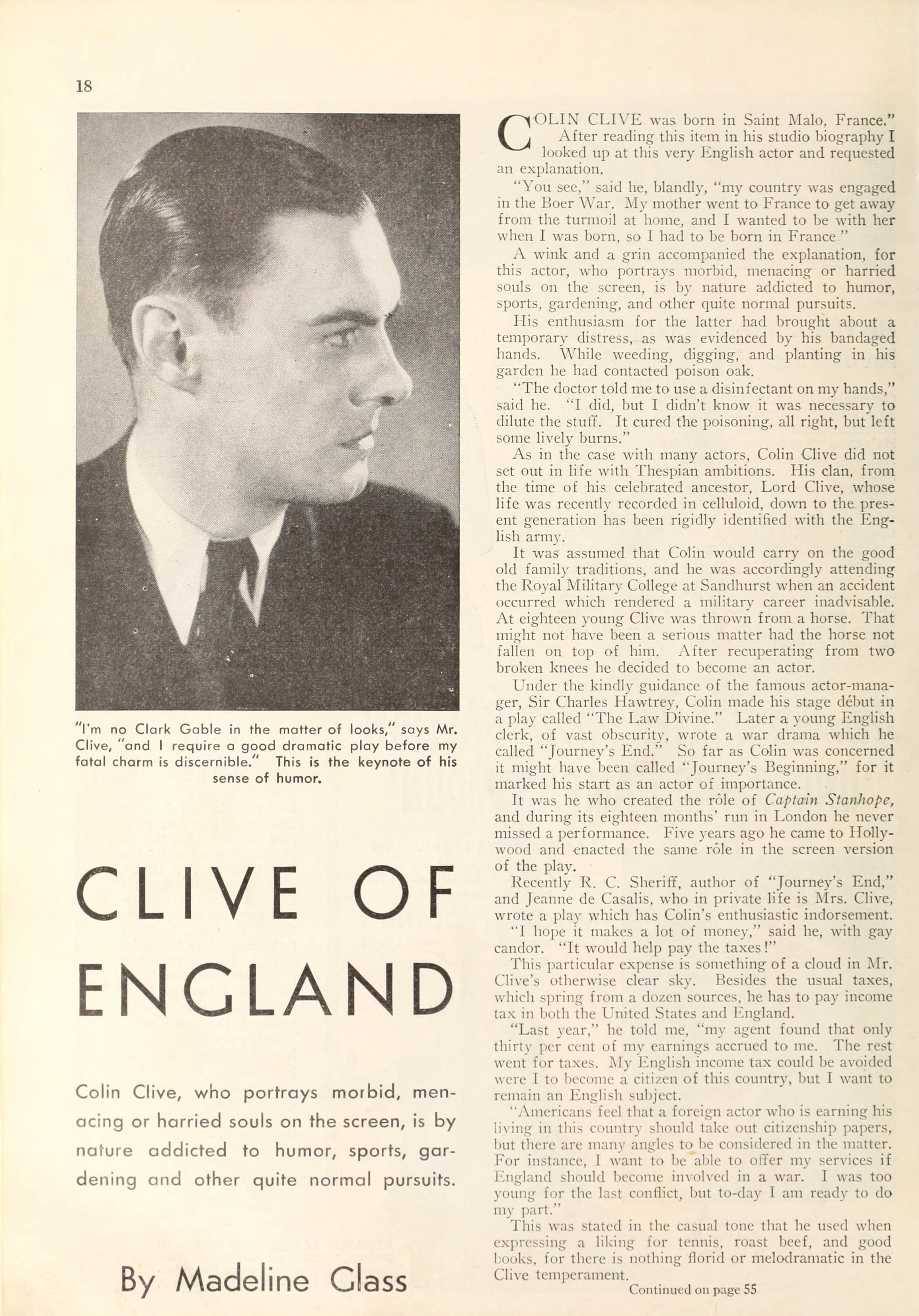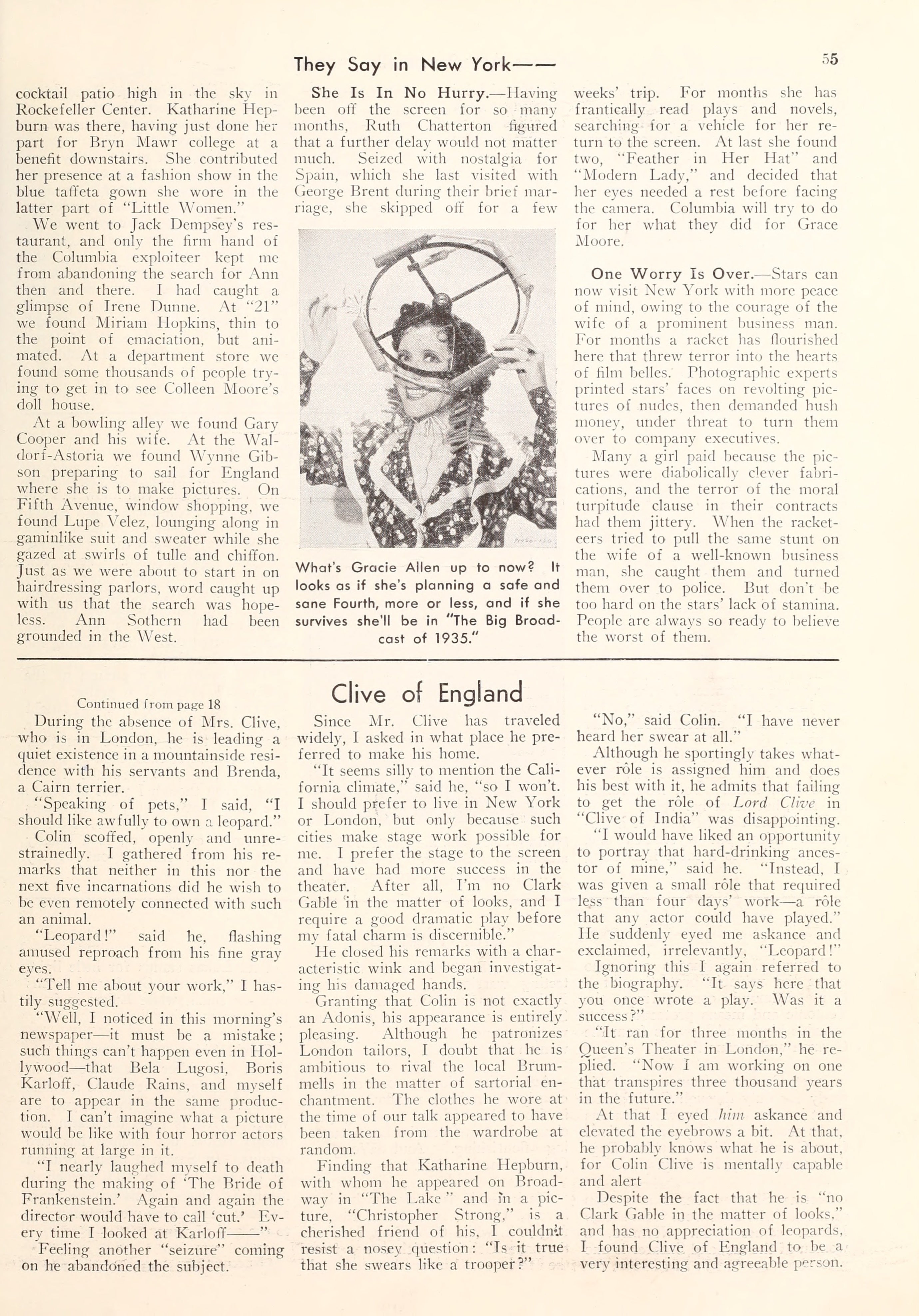Colin Clive — Clive of England (1935) 🇺🇸

“Colin Clive was born in Saint Main, France.” After reading this item in his studio biography I looked up at this very English actor and requested an explanation.
by Madeline Glass
“You see,” said he, blandly, “my country was engaged in the Boer War. My mother went to France to get away from the turmoil at home, and I wanted to be with her when I was born, so I had to be born in France.”
A wink and a grin accompanied the explanation, for this actor, who portrays morbid, menacing or harried souls on the screen, is by nature addicted to humor, sports, gardening, and other quite normal pursuits.
His enthusiasm for the latter had brought about a temporary distress, as was evidenced by his bandaged hands. While weeding, digging, and planting in his garden he had contacted poison oak.
“The doctor told me to use a disinfectant on my hands,” said he. “I did, but I didn’t know it was necessary to dilute the stuff. It cured the poisoning, all right, but left some lively burns.”
As in the case with many actors, Colin Clive did not set out in life with Thespian ambitions. His clan, from the time of his celebrated ancestor, Lord Clive, whose life was recently recorded in celluloid, down to the present generation has been rigidly identified with the English army.
It was assumed that Colin would carry on the good old family traditions, and he was accordingly attending the Royal Military College at Sandhurst when an accident occurred which rendered a military career inadvisable. At eighteen young Clive was thrown from a horse. That might not have been a serious matter had the horse not fallen on top of him. After recuperating from two broken knees he decided to become an actor.
Under the kindly guidance of the famous actor-manager, Sir Charles Hawtrey, Colin made his stage debut in a play called The Law Divine. Later a young English clerk, of vast obscurity, wrote a war drama which he called Journey’s End. So far as Colin was concerned it might have been called Journey’s Beginning, for it marked his start as an actor of importance.
It was be who created the role of Captain Stanhope, and during its eighteen months’ run in London he never missed a performance. Five years ago he came to Hollywood and enacted the same role in the screen version of the play.
Recently R. C. Sheriff, author of Journey’s End, and Jeanne de Casalis, who in private life is Mrs. Clive, wrote a play which has Colin’s enthusiastic indorsement.
“I hope it makes a lot of money,” said he, with gay candor. “It would help pay the taxes!”
This particular expense is something of a cloud in Mr. Clive’s otherwise clear sky. Besides the usual taxes, which spring from a dozen sources, he has to pay income tax in both the United States and England.
“Last year,” he told me, “my agent found that only thirty per cent of my earnings accrued to me. The rest went for taxes. My English income tax could be avoided were I to become a citizen of this country, but I want to remain an English subject.
“Americans feel that a foreign actor who is earning his living in this country should take out citizenship papers, but there are many angles to be considered in the matter. For instance, I want to be able to offer my services if England should become involved in a war. I was too young for the last conflict, but to-day I am ready to do my part.”
This was stated in the casual tone that he used when expressing a liking for tennis, roast beef, and good looks, For there is nothing florid or melodramatic in the Clive temperament.
During the absence of Mrs. Clive, who is in London, he is leading a quiet existence in a mountainside residence with his servants and Brenda, a Cairn terrier.
“Speaking of pets,” I said, “I should like awfully to own a leopard.”
Colin scoffed, openly and unrestrainedly. I gathered from his remarks that neither in this nor the next five incarnations did he wish to be even remotely connected with such an animal.
“Leopard!” said he, flashing amused reproach from his fine gray eyes.
“Tell me about your work,” I hastily suggested.
“Well, I noticed in this morning’s newspaper — it must be a mistake; such things can’t happen even in Hollywood — that Bela Lugosi, Boris Karloff, Claude Rains, and myself are to appear in the same production. I can’t imagine what a picture would be like with four horror actors running at large in it.
“I nearly laughed myself to death during the making of The Bride of Frankenstein. Again and again the director [James Whale] would have to call ‘cut.’ Every time I looked at Karloff —”
Feeling another “seizure” coming on he abandoned the subject.
Since Mr. Clive has traveled widely, I asked in what place he preferred to make his home.
“It seems silly to mention the California climate,” said he, “so I won’t. I should prefer to live in New York or London, but only because such cities make stage work possible for me. I prefer the stage to the screen and have had more success in the theater. After all, I’m no Clark Gable in the matter of looks, and I require a good dramatic play before my fatal charm is discernible.”
He closed his remarks with a characteristic wink and began investigating his damaged hands.
Granting that Colin is not exactly an Adonis, his appearance is entirely pleasing. Although he patronizes London tailors, I doubt that he is ambitious to rival the local Brummells in the matter of sartorial enchantment. The clothes he wore at the time of our talk appeared to have been taken from the wardrobe at random.
Finding that Katharine Hepburn, with whom he appeared on Broadway in The Lake and in a picture, Christopher Strong, is a cherished friend of his, I couldn’t resist a nosey question: “Is it true that she swears like a trooper?”
“No,” said Colin. “I have never heard her swear at all.”
Although he sportingly takes whatever role is assigned him and does his best with it, he admits that failing to get the role of Lord Clive in Clive of India was disappointing.
“I would have liked an opportunity to portray that hard-drinking ancestor of mine,” said he. “Instead, I was given a small role that required less than four days’ work — a role that any actor could have played.” He suddenly eyed me askance and exclaimed, irrelevantly, “Leopard!”
Ignoring this I again referred to the biography. “It says here that you once wrote a play. Was it a success?”
“It ran for three months in the Queen’s Theater in London,” he replied. “Now I am working on one that transpires three thousand years in the future.”
At that I eyed him askance and elevated the eyebrows a bit. At that, he probably knows what he is about, for Colin Clive is mentally capable and alert.
Despite the fact that he is “no Clark Gable in the matter of looks.” and has no appreciation of leopards, I found Clive of England to be a very interesting and agreeable person.

“I’m no Clark Gable in the matter of looks,” says Mr. Clive, “and I require a good dramatic play before my fatal charm is discernible.” This is the keynote of his sense of humor.

Collection: Picture Play Magazine, July 1935
